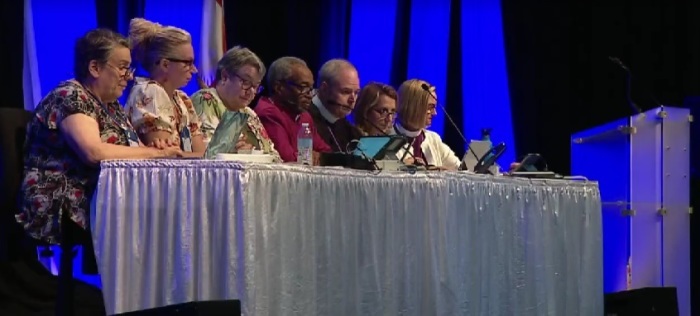Episcopal Church bishops reject resolution declaring Israel an 'apartheid' state

The Episcopal Church House of Bishops has rejected resolutions that would have labeled Israel an apartheid state and endorsed divestment efforts against the Middle Eastern nation while approving measures calling for an immediate ceasefire in Gaza.
At the 81st General Convention held in Louisville, Kentucky, on Sunday, the bishops voted down four resolutions tied to the Israeli-Palestinian conflict and Israel's war against the terror group Hamas in the Gaza Strip.
These included a resolution labeling Israel's legal system apartheid, a resolution expressing solidarity with the Boycott, Divestment, Sanctions Movement, a resolution identifying the Palestinians as "Indigenous peoples of the land between the Mediterranean Sea and the Jordan River," and a resolution condemning Christian Zionism, reported Episcopal News Service.
The bishops passed Resolution D013, a measure that condemned the Oct. 7 Hamas terror attack on Israel, which killed about 1,200 people, mostly civilians. The resolution also condemned Israel's military offensive in the Gaza Strip in response to the Oct. 7 attack while also advocating for a two-state solution to the ongoing conflict. The resolution's author called it a "a degree of Anglican moderation and pragmatism" on a hot-button issue.
The Episcopal bishops also passed Resolution D009, which called on the United States to contribute to the "long-term rebuilding of Gaza," and Resolution D007, which championed "Peace Through Equal Rights in Israel/Palestine."
The three approved resolutions will next go to the Episcopal House of Deputies for consideration.
During the discussion on the apartheid resolution, Southeast Florida Bishop Peter Eaton objected to the measure, saying that "it has long been discredited in most academic circles to use the word 'apartheid' with respect to the government and people of Israel."
"There is a distinction that needs to be made," Eaton continued. "It is perfectly reasonable to criticize the actions of any particular government. It is not reasonable to characterize a government by a word like 'apartheid.'"
"I do not think that this House or this Convention wants to pass any resolutions, particularly in this very difficult time, that could be reasonably interpreted as anti-Israel resolutions."
Northern Indiana Bishop Edward Little also opposed the resolution, arguing that the measure, if approved, would "forever end our ability to stand between Israelis and Palestinians as mediators, it would make us advocates of one side of the conflict over the other, and our Israeli and Jewish friends would see us as relentlessly hostile to them."
On Oct. 7, 2023, Hamas militants launched a series of attacks in southern Israel. In addition to killing approximately 1,200 people, extremists abducted around 250 individuals hostage, including several American citizens.
In response, Israel launched an air and ground offensive on Hamas targets within the Gaza Strip with the goals of destroying the Islamic terrorist group, which has controlled the Gaza Strip since 2007, and freeing the hostages.
The Hamas-controlled Gaza Health Ministry reports that at least 37,000 people have died in Gaza since the war began but doesn't differentiate between civilians and combatants. The Israel Defense Forces has accused Hamas and the Palestinian Islamic Jihad terror group of using minors for military purposes.
The most recent Integrated Food Security Phase Classification analysis reports that nearly the entire population of Gaza will likely face high levels of acute food insecurity through September 2024, stating that one in five Gazans go day and night without eating.
"About 96 percent of the population in the Gaza Strip (2.15M people) face high levels of acute food insecurity through September 2024," the report states.
"While the whole territory is classified in Emergency (IPC Phase 4), over 495,000 people (22 percent of the population) are still facing catastrophic levels of acute food insecurity (IPC Phase 5). In this phase, households experience an extreme lack of food, starvation, and exhaustion of coping capacities."



























